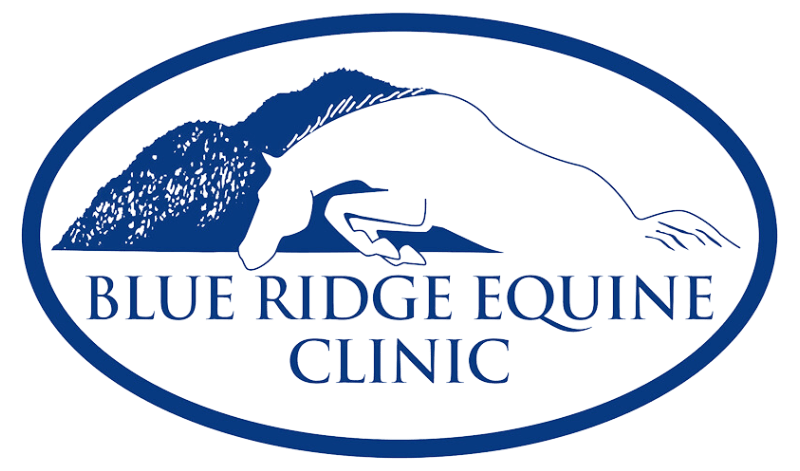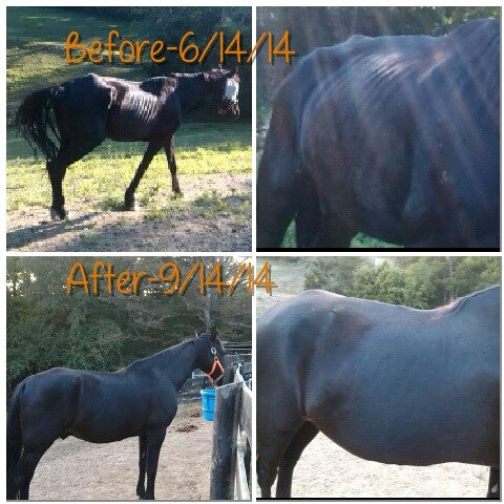Rescue Horse Success Story!
“Raven is a 12 year old Tennessee Walker gelding that arrived at our farm on 6/14/14. I picked him up only knowing that he was underweight but looked better than he did over the winter. He is an owner surrender- the former owner not having a good place to keep him and not able to afford the proper feed. A couple of weeks prior to picking him up I sent sweet feed home with the owner and directions on how to start feeding it. When I picked him up, I was unsure if he had the energy to withstand the trailer ride back to my farm as he was severely malnourished. Upon arrival at my farm he weighed 848 lbs, we dewormed him and introduced him to our herd. Dr. Hecking came out after he had been with us for about two weeks and floated his teeth and checked him over and agreed that it seemed to be a malnourishment issue only and his ideal weight should be somewhere between 1000-1100 lbs. Once his weight increased, Ray received all of his shots and proper deworming medications. Ray’s feeding schedule was quite intense. He was fed a combination of two different sweet feeds, beet pulp, alfalfa, cocoa soya, a weight supplement and free range hay. Ray was extremely nervous and during feeding times I had to stand with him so that he would not leave his food- for the first 2 ½ months I spent a total of 3 hours per day feeing him. I do not know exactly how many pounds of food he was consuming per day but he received 4 – 8 qt buckets of the beet pulp/alfalfa mixture and one 8qt bucket twice a day.
Raven is now 1020lbs and the leader of herd. He has a great personality and is super friendly with most people. He still has some weight left to gain but he is eating an almost normal diet and feeding time is down to a total of 45 minutes per day. Raven seems to be very happy in his forever home, he has lots of energy and likes the attention from my children. Over the next few weeks I do hope to take him for a test drive as I am told he was an excellent trail horse.
Thank you to Blue Ridge Equine for promptly visiting Raven and examining him so quickly and providing me with information on ways to achieve his ideal weight. Floating his teeth and shots have been a key part in his recovery.”
Researchers analyzed FEC data 14, 45 and 90 days following treatment. At 14 days post-treatment, the mean FEC reduction was 99.9% for moxidectin-treated mares and 41.9% for fenbendazole-treated mares. Statistically significant differences were observed 45 and 90 days post-treatment, as well. This confirms small strongyle resistance to fenbendazole to be widespread, while moxidectin remains effective for controlling these harmful parasites. The rapidly dissolving formula of QUEST PLUS (moxidectin/praziquantel) Gel and QUEST (moxidectin) Gel are proven effective against encysted and larval stages of small strongyles and safe for use in horses and ponies, and foals 6 months of age and older.
IMPORTANT SAFETY INFORMATION: Do not use QUEST Gel or QUEST PLUS Gel in foals less than 6 months of age or in sick, debilitated and underweight horses. Do not use in other animal species, as severe adverse reactions, including fatalities in dogs, may result.
This study was funded by Zoetis the makers of Quest. This study was reviewed and provides valuable information for your veterinarian to use to help make decisions regarding your horses health care. It does not mean that Quest should always be used instead of Panacur but suggests that the potential for resistance should be considered when determining which dewormer is right for your horse. Talk with your veterinarian to decide which dewormers you should be administering to your horses.

